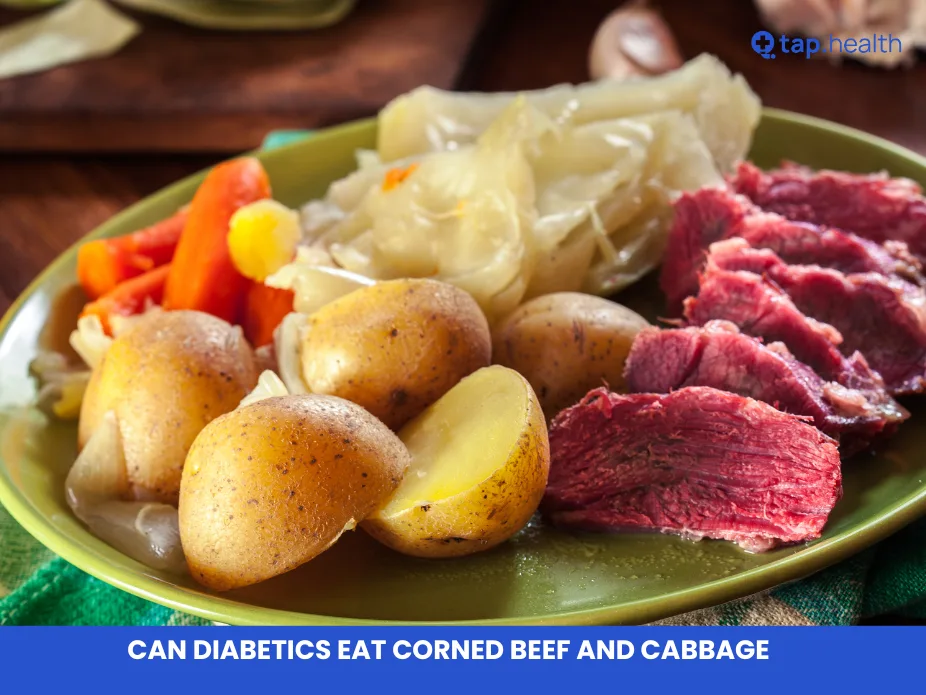Is it Safe to Enjoy This Classic Dish When You Have Diabetes?
When it comes to managing diabetes, food choices are critical. Certain foods can help regulate blood sugar, while others may pose challenges. One classic comfort food that often comes up is corned beef and cabbage, typically served as a hearty, flavorful meal. But for those living with diabetes, the question remains: Can diabetics eat corned beef and cabbage?
The short answer is yes, but with some important considerations. Let’s dive deeper into the nutritional factors, potential impacts, and how you can make this dish diabetes-friendly.
Nutritional Breakdown of Corned Beef and Cabbage
Corned Beef: Corned beef is made from brisket (a cut of beef), and it’s cured with salt and spices. This gives it a distinctive flavor but also affects its nutritional profile.
- Protein: Corned beef is a good source of protein, which is essential for muscle growth and repair, and can help you feel full for longer.
- Sodium: One of the main concerns with corned beef is its high sodium content due to the curing process. Too much sodium can contribute to high blood pressure, a common issue for people with diabetes.
- Fat: Corned beef is also high in fat, particularly saturated fat, which can impact heart health. Diabetics should limit their intake of saturated fats to reduce the risk of cardiovascular disease.
Cabbage: On the other hand, cabbage is a non-starchy vegetable, meaning it’s low in carbohydrates, making it a great option for diabetics. Additionally, cabbage is high in fiber, which helps stabilize blood sugar levels. It’s packed with vitamins like Vitamin K and Vitamin C, which contribute to overall health and immune function.
Real-Life Scenario
Meet Ravi, a 50-year-old man from Mumbai, who was recently diagnosed with type 2 diabetes. Ravi loves his family’s traditional corned beef and cabbage dish but is worried about whether it’s safe to eat. After discussing his concerns with his nutritionist, Ravi learned that he could enjoy his favorite meal, but with some modifications.
Ravi’s Solution: Ravi chooses a smaller portion of corned beef (about 3 ounces) and loads up his plate with cabbage. He also opts for a low-sodium version of corned beef to minimize the impact on his blood pressure. As a result, Ravi enjoys his meal without compromising his health.
Expert Contributions
Dr. Anjali Kumar, a leading endocrinologist from New Delhi, explains, “For people with diabetes, eating a variety of foods in moderation is key. While corned beef is okay in small portions, it’s important to balance it with low-carb vegetables like cabbage. The sodium and fat in corned beef can impact heart health, so it’s essential to be mindful of these factors.”
(Reference: Dr. Anjali Kumar’s Interview on Diabetes and Diet)
How Corned Beef Affects Diabetics
If you’re living with diabetes, here are the factors to keep in mind when enjoying corned beef:
- Impact on Blood Sugar: Corned beef doesn’t contain many carbohydrates, so it has a minimal direct effect on blood sugar. However, if you consume large portions or pair it with high-carb sides, it can indirectly impact your blood sugar levels.
- Sodium and Blood Pressure: The high sodium content in corned beef can raise your blood pressure. People with diabetes often face a higher risk of hypertension, so it’s vital to limit sodium intake. Opt for lower-sodium versions when possible, or balance it with other low-sodium foods throughout the day.
- Saturated Fat and Heart Health: Diabetics are more likely to have heart disease, so it’s crucial to limit saturated fat intake. Choosing leaner cuts of corned beef can reduce the impact on heart health.
Healthy Modifications for Corned Beef and Cabbage
- Go for Leaner Cuts: When buying corned beef, look for leaner cuts that have less fat. This will make the meal healthier without sacrificing flavor.
- Reduce Sodium: If possible, choose low-sodium corned beef. You can also rinse off some of the brine before cooking to reduce the sodium content further.
- Increase Vegetable Intake: Cabbage is an excellent vegetable for diabetics, so fill your plate with it. Consider adding other low-carb vegetables like spinach, kale, or broccoli to your meal for added fiber and nutrients.
- Smaller Portions: As with any rich food, portion control is key. Keep your serving of corned beef to about 3 ounces, and pair it with a large serving of cabbage and other non-starchy vegetables.
- Watch the Sides: Avoid starchy sides like mashed potatoes or bread, which can cause a spike in blood sugar. Instead, opt for a side salad or a whole grain like quinoa or brown rice.
Can Diabetics Eat Corned Beef and Cabbage for Special Occasions?
Yes, diabetics can enjoy corned beef and cabbage on special occasions, but it’s essential to stick to the following guidelines:
- Enjoy in Moderation: As with any indulgent food, portion control is key. Keep your servings small, especially when enjoying foods high in sodium and fat.
- Balance with Other Meals: If you have a heavier meal, balance it out with lighter meals during the rest of the day.
- Monitor Your Blood Sugar: Keep an eye on your blood sugar levels after eating. If you notice any unusual spikes, it may be a sign that the meal needs to be adjusted in the future.
Expert Advice for Diabetics
It’s always a good idea to consult with your healthcare provider or a registered dietitian when planning meals, especially if you’re unsure about certain foods. Dr. Neha Singh, a diabetes educator from Bangalore, recommends, “The best approach is to eat a variety of foods and include plenty of vegetables in every meal. Diabetics can still enjoy traditional meals like corned beef and cabbage, as long as they’re mindful of portion sizes and nutrient balance.”
(Reference: Diabetes Education with Dr. Neha Singh)
FAQ on Can Diabetics Eat Corned Beef and Cabbage?
1. Can I eat corned beef if I have type 2 diabetes?
Yes, you can, but it’s important to limit portion sizes and consider the high sodium and fat content. Pairing it with plenty of non-starchy vegetables is a good idea.
2. Does corned beef spike blood sugar?
Corned beef is low in carbohydrates, so it doesn’t directly spike blood sugar. However, large portions or high-carb side dishes can impact your blood sugar levels.
3. How can I make corned beef and cabbage healthier for diabetes?
Choose leaner cuts of corned beef, reduce sodium intake, increase the amount of cabbage, and avoid high-carb sides.
4. Is cabbage good for diabetics?
Yes, cabbage is a low-carb, high-fiber vegetable that can help stabilize blood sugar levels. It’s an excellent choice for anyone managing diabetes.
Conclusion
Corned beef and cabbage can be a part of a healthy meal plan for people with diabetes, but moderation is key. By making small adjustments like reducing sodium, choosing leaner cuts, and loading up on vegetables, you can enjoy this classic dish without compromising your health. Always remember that balance, portion control, and mindful choices are crucial when managing diabetes.




